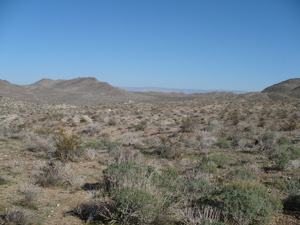You are currently browsing the daily archive for January 22, 2008.

In “The Land,” Mary Austin wrote about the meaning of the expression “Lost Borders” to the native American people of California who taught her that expression. It referred to the difficulty of setting borders between the separate lands of the tribes in the washes and “inextricable disordered ranges” of mountains in the desert.
Mary Austin saw in the expression “lost borders” an association between borders and the laws by which men maintain order among themselves. The desert was a place without laws, without order. Beyond that association, she saw in the expression a metaphor for what happened to men who came in search of fortune in the desert, in California. She wrote, “Out there, then, where the law and landmarks fail together, the souls of little men fade out at the edges, leak from them as water from wooden pails warped asunder.” She continued, “Out there where the borders of conscience break down, where there is no convention, and behavior is of little account except as it gets you your desire, almost anything might happen; does happen, in fact …”
So much has changed since Mary Austin wrote those words: the desert she knew has been tamed and settled. All of California’s wild land, much of which is arid enough to be called desert, has been watered and tamed and settled. Physical borders extend throughout the desert now. The little men whose souls faded out at the edges changed the desert and their way has become the habit of the people who have settled in California. The physical desert that Mary Austin knew is no longer there, but California remains a place where souls fade out at the edges, where desire counts more than conscience.
Is it a bad thing for desire to count more than conscience? In the workings of evolution, in natural selection, doesn’t desire does count more than conscience? Is that not what ensures the survival of life? After all, what is a soul worth in a land of lost borders?
In Mary Austin’s estimation, a man’s soul was worth more than the fortune of minerals that a man might extract from the desert. To her, the desert was a place where higher desires were fulfilled – the desires of the soul. In Land of Little Rain, she wrote that the desert fulfilled desires for “deep breaths, deep sleep, and the communion with the stars.”

Recent Comments